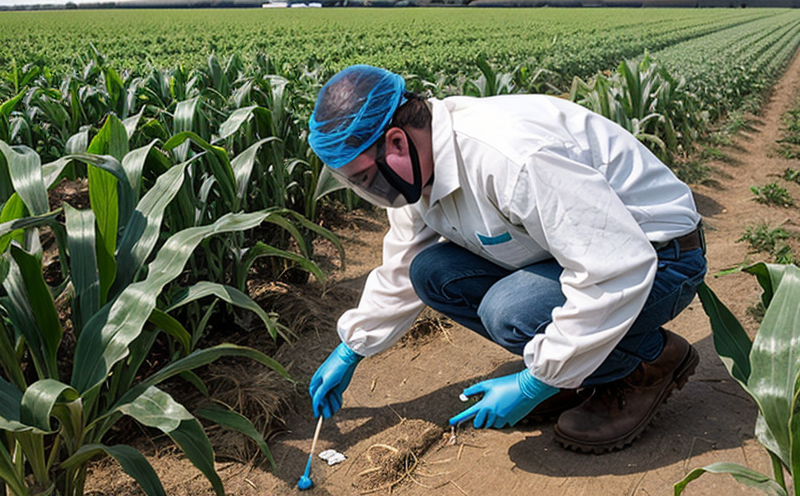Maximum Residue Limit (MRL) Compliance Testing
The concept of Maximum Residue Limits (MRLs) is critical in agriculture and forestry testing. MRLs are regulatory limits set by governments to ensure that pesticides do not exceed safe levels in the food we consume or products we use. This service focuses on ensuring compliance with these regulations through precise, standardized laboratory testing. For quality managers, compliance officers, R&D engineers, and procurement specialists, this is a vital tool for maintaining product safety and regulatory adherence.
In the agricultural sector, the presence of pesticides can vary widely depending on the type of pesticide used, environmental conditions, application methods, and crop species. Ensuring that the residues in crops do not exceed MRLs involves meticulous testing protocols and robust analytical techniques. This service leverages state-of-the-art equipment and methodologies to provide accurate results, which are essential for maintaining product integrity.
Compliance with MRLs is not just a regulatory requirement; it also affects consumer confidence, market access, and brand reputation. Non-compliance can lead to product recalls, fines, and damage to the company's image. By offering this service, our laboratory ensures that clients are fully compliant with international standards such as ISO 17025 for proficiency in testing.
The process of MRL compliance testing involves several key steps:
- Sample collection from various points within a crop field or storage facility
- Cleaning and preparation of samples to ensure accurate analysis
- Application of appropriate analytical methods such as GC-MS, LC-MS/MS, or HPLC
- Data interpretation using validated protocols to determine if residues are within acceptable limits
- Reporting the results in a transparent and clear manner for client review
This service is crucial not only for compliance but also for ensuring that products meet market demands. With increasing consumer awareness about pesticide use, there is a growing need to provide evidence of safe practices.
Why It Matters
The importance of MRL compliance testing in agriculture and forestry cannot be overstated. Regulatory authorities around the world enforce strict MRLs to protect public health and ensure that agricultural products are safe for consumption or use. Non-compliance can lead to significant consequences, including product seizures, recalls, and legal action.
For quality managers, maintaining compliance is essential for protecting brand reputation and ensuring market access. In regions with stringent import regulations, such as the EU, Japan, and Australia, non-compliance can result in outright bans or severe restrictions on exports. This service helps companies navigate these complexities by providing accurate and reliable data that can be used to demonstrate adherence to regulatory requirements.
For R&D engineers, MRL compliance testing is a critical component of product development. By ensuring that new formulations do not exceed MRLs, they can introduce safer products to the market while also avoiding potential legal issues. This service provides them with the necessary data to make informed decisions about pesticide use and formulation.
For procurement officers, MRL compliance testing ensures that raw materials meet quality standards before being processed into finished products. This helps prevent contamination of final products and maintains consistency in product quality across different batches.
Scope and Methodology
| Sample Type | Testing Method | Target Pesticides | Acceptance Criteria |
|---|---|---|---|
| Cereals, grains, pulses | Liquid Chromatography-Mass Spectrometry (LC-MS/MS) | Acephate, Chlorpyrifos, Diazinon | MRLs as per Codex Alimentarius |
| Vegetables and fruits | Gas Chromatography-Mass Spectrometry (GC-MS) | Bifenthrin, Cypermethrin, Deltamethrin | MRLs as per Codex Alimentarius |
| Legumes and nuts | HPLC with UV detection | Aldicarb, Malathion, Methomyl | MRLs as per Codex Alimentarius |
The scope of MRL compliance testing is extensive, covering a wide range of crops including cereals, vegetables, fruits, legumes, and nuts. The methodology involves the use of advanced analytical techniques such as Gas Chromatography-Mass Spectrometry (GC-MS), Liquid Chromatography-Mass Spectrometry (LC-MS/MS), and High Performance Liquid Chromatography (HPLC) with UV detection.
Target pesticides vary depending on the crop type. For cereals, grains, and pulses, common targets include Acephate, Chlorpyrifos, and Diazinon. Vegetables and fruits are tested for Bifenthrin, Cypermethrin, and Deltamethrin. Legumes and nuts require testing for Aldicarb, Malathion, and Methomyl.
Acceptance criteria for these tests are based on the Codex Alimentarius standards, which provide internationally recognized guidelines for food safety and quality. Compliance with these standards ensures that products meet regulatory requirements and can be safely consumed or used.
Competitive Advantage and Market Impact
- Informed Decision-Making: By providing accurate MRL data, clients can make informed decisions about pesticide use and formulation. This leads to safer products and reduced risk of non-compliance.
- Enhanced Reputation: Compliance with regulatory standards enhances the reputation of companies and builds trust with consumers. This is particularly important in markets where consumer awareness about pesticides is high.
- Market Access: MRL compliance testing ensures that products meet international import regulations, thereby facilitating market access to key export destinations like the EU, Japan, and Australia.
- Cost Savings: By avoiding recalls and legal actions, companies can save significant costs associated with non-compliance. This service helps prevent such expenses by ensuring that products are in full compliance before they reach the market.
MRL compliance testing is a key differentiator for agricultural and forestry businesses. It not only ensures regulatory compliance but also enhances brand reputation, facilitates market access, and provides cost savings through avoidance of potential legal issues and product recalls.





